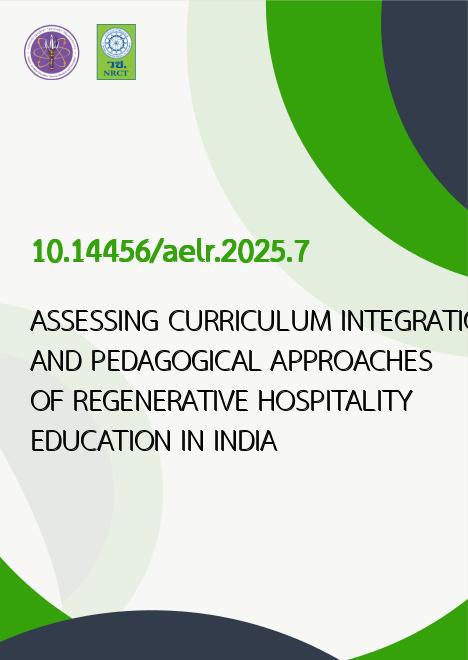
|
ASSESSING CURRICULUM INTEGRATION AND PEDAGOGICAL APPROACHES OF REGENERATIVE HOSPITALITY EDUCATION IN INDIA |
|---|---|
| รหัสดีโอไอ | |
| Creator | Suraj Jaywant YADAV |
| Title | ASSESSING CURRICULUM INTEGRATION AND PEDAGOGICAL APPROACHES OF REGENERATIVE HOSPITALITY EDUCATION IN INDIA |
| Publisher | Asian Education and Learning Review |
| Publication Year | 2568 |
| Journal Title | Asian Education and Learning Review |
| Journal Vol. | 3 |
| Journal No. | 2 |
| Page no. | Article 2 |
| Keyword | Regenerative Hospitality Education, Curriculum, Pedagogy, India |
| URL Website | https://so07.tci-thaijo.org/index.php/AELR |
| Website title | https://so07.tci-thaijo.org/index.php/AELR/article/view/5343 |
| ISSN | 2985-2862 |
| Abstract | The hospitality industry is crucial to India's economy and cultural heritage. However, traditional hospitality education has often overlooked principles of sustainability and regeneration. This study aims to evaluate the degree to which regenerative concepts have been incorporated into hospitality curricula and pedagogical approaches across Indian institutions. A mixed-methods approach involved quantitative surveys of hospitality educators nationwide and qualitative interviews with select faculty and industry representatives. The findings reveal uneven adoption of regenerative hospitality concepts, with considerable variations among institutions. While some progressive programs have successfully woven sustainability and ethical tourism throughout their curricula, others still prioritize conventional business management teachings. Barriers to holistic integration include institutional inertia, faculty training gaps, and perceived tensions with industry expectations. The study highlights exemplary practices in experiential learning, interdisciplinary collaboration, and community engagement that enable transformative experiences for hospitality students. Strategic curriculum reforms and innovative pedagogies are recommended to align Indian hospitality education with the emerging global paradigm of regenerative tourism. By prioritizing environmental stewardship, social responsibility, and cultural preservation, hospitality programs can nurture future leaders capable of driving meaningful change in this vital economic sector. |
